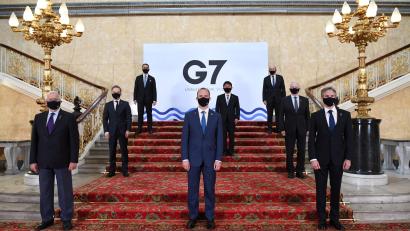
- The G7 has supported Taiwan, criticised Myanmar’s military for coup and ordered Iran to release foreign nationals
- G7 has called to expand the production of COVID-19 vaccines but has not called for a waiver of intellectual property rights of the leading pharmaceutical firms
- The G7 has also not announced any fresh funding to improve greater access to vaccines for poorer countries
The G7 have accused China of human rights abuses and Russian of aggression against Ukraine, as they wrap up the first in-person meeting in two years. Apart from castigating the two countries in words, no concrete steps against them were advised or taken at the meet. However, the G7 have expressed support for Taiwan and Ukraine.
G7 foreign ministers, who met in London under tight coronavirus restrictions, said in a 12,400-word communique that Russia was trying to undermine democracies and threatening Ukraine while China was guilty of human rights abuses and of using its economic clout to bully others.
As there is no concrete action mentioned in the communique, the G7 censure should not worry either Chinese President Xi Jinping or his Russian counterpart Vladimir Putin.
Founded in 1975 as a forum for the West’s richest nations to discuss crises such as the OPEC oil embargo, the G7 this week addressed several issues including the ‘threats’ from China and Russia. The meet also deliberated on ways to tackle the coronavirus pandemic.
The G7 said it would bolster collective efforts to stop China’s “coercive economic policies” and to counter Russian disinformation.
G7 on China
“I think [China is] more likely to need to, rather than react in anger, it is more likely going to need to take a look in the mirror and understand that it needs to take into account this growing body of opinion, that thinks these basic international rules have got to be adhered to,” British Foreign Secretary Dominic Raab said.
The G7 has supported Taiwan’s participation in World Health Organization forums and the World Health Assembly – and expressed concerns about “any unilateral actions that could escalate tensions” in the Taiwan Strait. China regards Taiwan as its own territory and opposes any official Taiwanese representation on an international level.
On its part, China says the West is a bully and that its leaders have a post-imperial mindset that makes them feel they can act like global policemen.
G7 on Russia
On Russia, the G7 was supportive of Ukraine but offered little beyond words. “We are deeply concerned that the negative pattern of Russia’s irresponsible and destabilising behaviour continues,” G7 ministers said.
“This includes the large build-up of Russian military forces on Ukraine’s borders and in illegally-annexed Crimea, its malign activities aimed at undermining other countries’ democratic systems, its malicious cyber activity, and [its] use of disinformation.”
Responding to the West criticism of its handling of Ukraine, Russia says the West is gripped by anti-Russian hysteria.
G7 on Iran and Myanmar
Foreign ministers from hosts Britain, plus the United States, France, Germany, Italy, Canada and Japan also called on Tehran to release foreign and dual nationals they said were being held arbitrarily in Iranian jails.
The G7 threatened Myanmar military government which staged a coup in February with fresh sanctions if it does not take immediate measures to return to democracy and conduct elections.
G7 on Vaccines
On the coronavirus pandemic, the G7 pledged to work with the industry to expand the production of affordable COVID-19 vaccines. But the group stopped short of calling for a waiver of intellectual property rights of the leading pharmaceutical firms like Pfizer and AstraZeneca who hold patents for most medicines required to treat the Covid19 infection.
There was also no immediate announcement on fresh funding to improve greater access to vaccines, despite repeated calls for the G7 to do more to help poorer countries. The poor countries are fully or majorly dependent on rich countries for vaccines and medicines for COVID-19 which is the primary reason for delay in vaccinating populations there.
Other Issues
The G7 final communique said that the group discussed the world’s most pressing geopolitical issues, including climate change and post-pandemic recovery.
